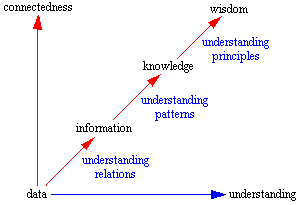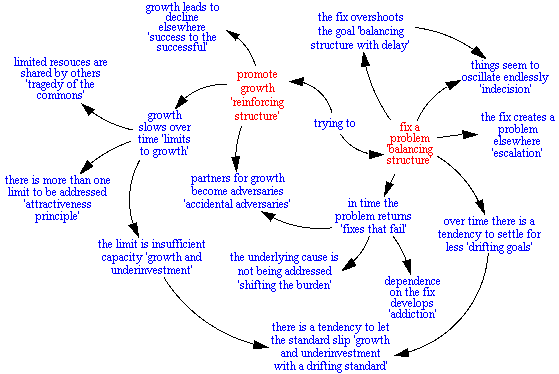
Somewhere along this list you discovered that what was being described was a refrigerator. You started out and you didn't know, you didn't know, you didn't know, and then you knew. And once you knew each statement after that simply added to the level of certainty with which you knew, for you already knew. Different people might connect after a different number of statements, and the statements could be provided in any order, yet at some point the connection happens. The point is that what we know we know because of patterns of association. The above set of statements represents a pattern, and when the pattern connects we know. Knowledge is quite simply a pattern representation with which we connect.
A more precise definition might be that knowledge is true justified belief that was acquired by a method that was, in the context, reliable. A subject's belief counts as knowledge when he has good reason to have that belief, the belief is true, and it was acquired by a method that was, in the context, reliable.
Knowledge Management is a recent area of interest for me. An area that got my attention because of some connections made during my continuing study of systems. I have pondered the relationship between data, information, knowledge, and wisdom for some time and from a systems perspective made the following connection.

Data: is represented as an item or event out of context with no relation to other things.
Information is represented by relationships between data, and possibly other information. The relationships may represent information, yet the relationships do not actually constitute information until they are understood. Also, the relationships which represent data have a tendency to be limited in context, mostly about the past or present, with little if any implication for the future.
Knowledge is represented by patterns between data, information, and possible other knowledge. These patterns may represent knowledge, yet the patterns do not actually constitute knowledge until they are understood. Also, the patterns which represent knowledge have a high level of predictability associated with them such that the pattern suggests its past, its present, and its future.
Wisdom is the patterns which represent knowledge are what they are because of foundational principles, which for a time I called eternal truths but people beat me up so much I stopped. When one understands these foundational principles they then understand why the knowledge is what it is.
Much of this connection was made base on my work with Archetypes.[1] It was discovered that there was a very definite pattern of interaction among the elements of an Archetype producing very distinct emergent characteristics. And these emergent characteristics were the result of the interaction of a very few foundational principles which seemed to represent universal truths -- or at least truths for which I was unable to find a contradictory example. In addition to the emergent characteristics of the Archetypes there were very distinct relations among the Archetypes themselves.
As an example of emergent characteristics, consider what happens with the relationships between principal in a savings account, interest rate, and the interest which is paid periodically.

Periodically the interest rate is used to calculate the interest from the principal and this interest is then added to the principal. The emergent characteristic of this structure is "growth." The principal "grows" over time, yet "growth" is a characteristic one can not find individually in any of the elements of this structure. This is on the same level as wetness being an emergent characteristic of the interaction of hydrogen and oxygen in the H2O molecular state. One can study hydrogen and oxygen, in isolation, from now until forever, and never discover the characteristic of wetness. Only when they are studied in their molecular interaction state, in mass numbers, will the characteristic of wetness emerge.
So what does all this have to do with data, information, knowledge, and wisdom? If I consider 5%, or 100, they are just pieces of data out of context. If I understand that the 5% is an interest rate, and 100 is principal, and that they interact in a multiplicative fashion to create interest, I have relationships between data, which represent information. When I understand the whole pattern represented above, I have knowledge regarding how the whole structure will emerge over time. As for the wisdom embedded based on fundamental principles, it is that any action which produces a result which encourages more of the same action forms a reinforcing structure which has an emergent characteristic of growth. So, depending on the level of understanding one has regarding the above structure, it can represent data, information, knowledge, or wisdom, or all of them when one gets to the wisdom stage.
As for the relationships among the Archetypes themselves it's a rather involved unfolding set of pattern relations.

I think I'm getting a bit off the focus I wanted to provide in terms of Knowledge Management: Bah Humbug! So let me return.
Knowledge Management seems to be the hot topic of the day, and I was initially seduced by it in terms of the implications for enhancing the performance of organizations. Yet is it really knowledge management that should be the focus? I managed to survive the formula fifties, the sensitive sixties, the strategic seventies, the excellent eighties, and find myself in the nanosecond nineties. And, for a time I thought I was headed for the LO oh's ­­ learning organization that is. I have now begun to think we're headed for the KM 2k's.
After experiencing numerous failed TQM and reengineering endeavors, I finally figured out that the root of the difficulty was not the technique employed but that organizations pursued the technique rather than what was really important ­­ i.e., where they wanted to go. Since these organizations didn't really understand where the key emphasis should be, they became wandering generalities rather than meaningful specifics. The techniques are just that ­­ techniques. They are a means to an end, not the end in themselves. According to Mike Davidson[2], the real meaningful questions are:
Techniques are important only to the extent they aid an individual or an organization to develop effective responses in these areas. If there is not a clear understanding of definitive answers in these areas, then techniques can be little more than the fads that we all have experienced. And Knowledge Management is just as susceptible to this as any other technique. So I say, Knowledge Management: Bah Humbug! Knowledge Management is not the answer, unless perhaps one is using knowledge management as an aid to developing an understanding in the areas of the questions listed above.